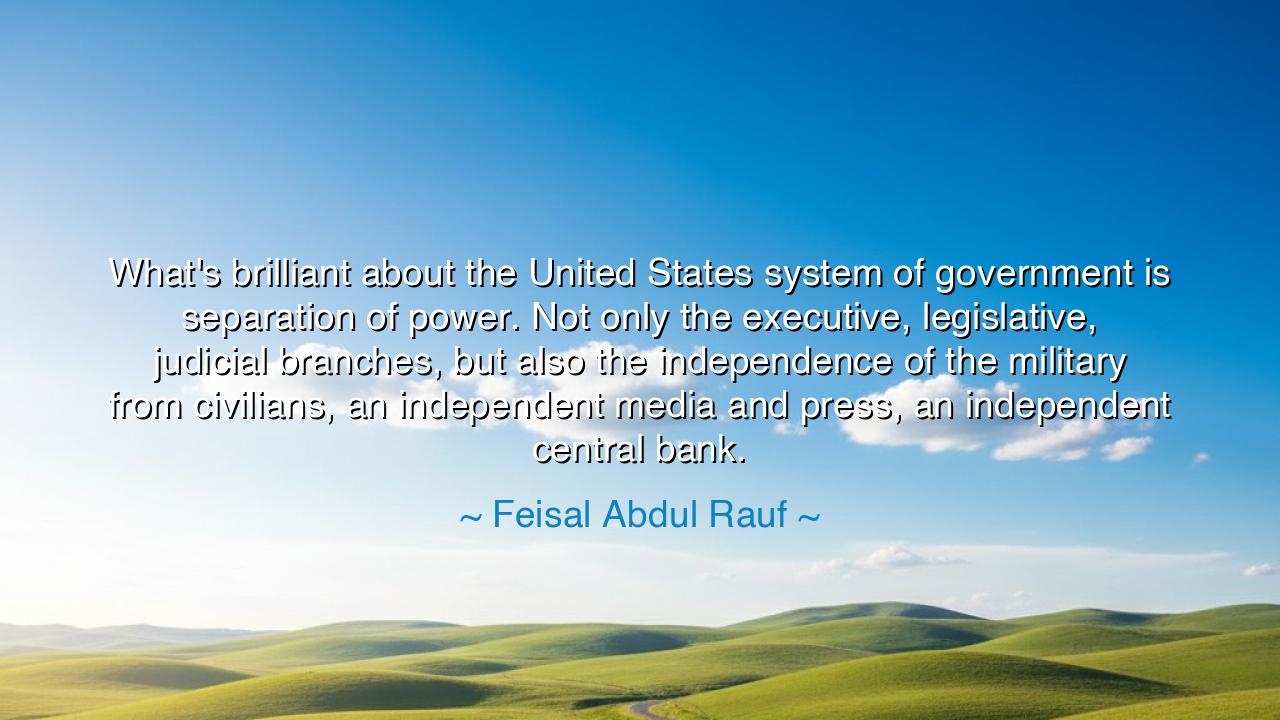
What's brilliant about the United States system of government is
What's brilliant about the United States system of government is separation of power. Not only the executive, legislative, judicial branches, but also the independence of the military from civilians, an independent media and press, an independent central bank.






When Feisal Abdul Rauf declared, “What’s brilliant about the United States system of government is separation of power. Not only the executive, legislative, judicial branches, but also the independence of the military from civilians, an independent media and press, an independent central bank,” he was not merely praising a structure of governance — he was unveiling a philosophy of balance, born from centuries of struggle against tyranny. His words echo the wisdom of the ancients, who knew that power, when concentrated in one hand, becomes poison. The brilliance he speaks of is not in might or wealth, but in restraint — in the deliberate division of authority so that freedom might endure beyond the ambitions of any one ruler.
In the forging of the American republic, the Founders stood as modern philosophers of order and liberty. Having witnessed the abuses of kings and empires, they understood that unchecked power corrupts even the noblest of men. Thus, they created a system where the Executive, Legislative, and Judicial branches would stand apart yet together — like three pillars supporting a temple that must not fall. Each was given strength, but also boundaries. Each was made to check the others, so that no single will could command the destiny of all. This was not chaos, but harmony — the deliberate weaving of limits to protect the people from the corruption of their own government.
But Rauf, with keen vision, extended his praise beyond those original three branches. He spoke of the independence of the military, the media, and the central bank — institutions that, though not written into the Constitution as coequal branches, are vital guardians of liberty in the modern age. For when the army bows to a political master, the republic begins to tremble; when the press is silenced, truth withers in the dark; and when the power of money becomes the tool of rulers, freedom is sold in secret. The brilliance of separation lies in this — that no single force, however powerful, may rule without the others standing watch.
History offers countless lessons of nations that forgot this truth. In Rome, when the legions ceased to serve the Senate and pledged allegiance to Caesar, the republic died, and an empire was born. In modern dictatorships, where the press is chained and the judiciary tamed, truth itself becomes a casualty of ambition. And even in peaceful lands, when greed overtakes the independence of banks or the pride of armies turns inward, the seeds of tyranny are sown. Thus, Rauf’s words are not praise alone — they are warning, a reminder that freedom is not maintained by power, but by its division.
The ancients knew that all things that live must breathe — and governments too must breathe through balance. The independent press is its voice, the independent judiciary its conscience, the independent military its shield, and the independent legislature its reason. When any of these falter, the body of liberty weakens. To keep them whole requires vigilance — not from rulers alone, but from every citizen who values truth above comfort, and justice above convenience.
Consider, then, how fragile such a system truly is. It survives not by the force of law alone, but by faith — faith in restraint, faith in integrity, faith in the unseen bond between freedom and responsibility. When a people forget this faith, when they trade independence for safety, when they mock the value of an impartial press or demand that judges obey the mob, they tear apart the very fabric that shields them from despotism. For liberty, like glass, once shattered, is not easily repaired.
So, my children of the republics yet to come, hear this lesson: separation of power is the architecture of freedom. Defend it as you would defend your own heart. Let no leader, no party, no passion convince you that concentration of authority is strength. Remember always — the mightiest tree stands because its roots spread wide and deep. So too with nations: they endure not through unity of control, but through harmony of independence. And if ever the time comes when one hand seeks to rule all, may you remember the wisdom of Feisal Abdul Rauf, and stand as guardians of the balance that keeps the light of liberty alive.






AAdministratorAdministrator
Welcome, honored guests. Please leave a comment, we will respond soon